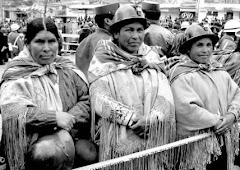 Part III: The ACTION
Part III: The ACTION The transformation to an economic structure consistent with the sustainable reduction of poverty and inequality in Bolivia requires many changes, for example: A new national economic policy framework; political unity and will; increased entrepreneurial capacities; better access to information and markets, credit and technology; new linkages between the popular economy and “value clusters”; the empowerment of women and young people in general; higher health and educational standards; favorable trade conditions; support and promotional activities on the part of local and national governments; and in general, a concerted effort to identify and take advantage of opportunities for fair and sustainable economic growth generated by the forces of globalization, while at the same time defending the country against its negative effects and forming part of the international advocacy movement that seeks greater global social and economic justice.
While the actions of the government and business sectors are ultimately the key to achieving these changes, such changes will only occur as a result of pressure from civil society. A first step is to initiate a process in which the workers themselves organize to generate and promote specific proposals for 1) the dignification of all forms of work in Bolivia, and for 2) the transformation of the economy in such a way so as to sustain dignified working conditions and opportunities over time. Finally, workers must also assume responsibility for developing and channeling their personal talents into productive processes that contribute to the broad economic and social goals mentioned in Part II.
In order to do so, it is necessary to engage and/or pressure three major groups of stakeholders: Government at the national and local levels, the national workers’ movement and the business sector.
Next Post….International Women’s Day Activities
Next Post….International Women’s Day Activities









No comments:
Post a Comment